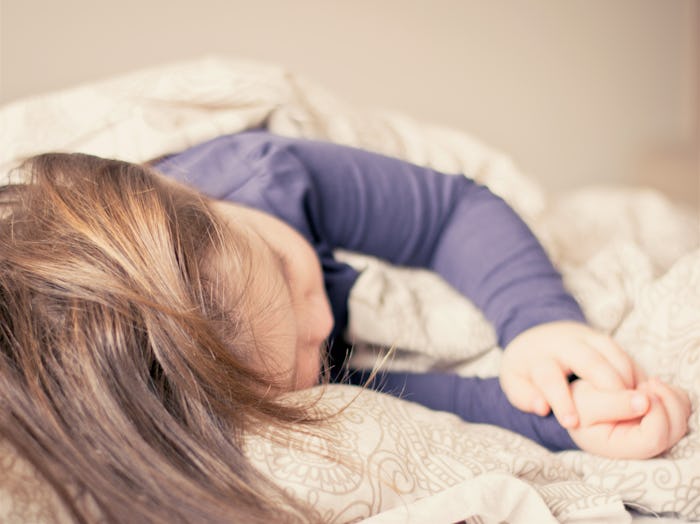Life

9 Weird, But Totally Normal Things Your Kid Will Do When You Stop Co-Sleeping
Kids may be resilient, but that doesn't mean they aren't affected by changes in their lives. New siblings, going to kindergarten, and even moving into their own bedrooms can send them into a tailspin, even if you don't think it's that big of a deal. That latter one is especially tough for the whole family because there are some weird but totally normal things your kid will do when you stop co-sleeping.
Regardless of why you chose to co-sleep, it's fair to decide one day that you want to take your bed back. Maybe your little one sleeps directly on top of you, maybe you're tired of being poked in the eye by a toddler at 6 a.m., or maybe you think your kid will sleep better in their own bed. Whatever the reason, transitioning your child to their bed after they've been co-sleeping can be tough. According to The Bump, there really is no one-size-fits-all guide to getting your child back into their own bed, but it does take a lot of patience, consistency, and work to make it happen. And because of that? You may notice your kid doing these nine weird but normal things after you stop co-sleeping. Think of it as your child adapting to what it means to be sleeping in their own bed — independence.
1They'll Start Waking Up In The Night
Your baby probably slept through the night when co-sleeping, and if they didn't, they very quickly fell back asleep because you were right there. But The Bump noted that once you stop co-sleeping, you may notice your little one is waking throughout the night because you are no longer right there to get them back to sleep. It will take some time to get rid of you as your baby's sleep association so that they can put themselves back to sleep in the middle of the night.
2They'll Wake Up Earlier Than Usual
I've definitely felt this one. When my daughter makes it into our bed on difficult nights or when she's sick, she sleeps way later than usual. Like, close to 10 a.m. In her own bed? I consider 7:30 a.m. sleeping in for her. So what's the deal? Dr. Craig Canapari, director of the Yale Pediatric Sleep Center, wrote on his website that one of the big reasons for co-sleeping is because parents don't want to get up early (And who can blame you?) It's just easier to bring them into bed with you, right? So when you give up co-sleeping altogether, don't be alarmed if your little one now thinks 6 a.m. is an appropriate time to wake instead of their usual 8 a.m.
3They'll Become Attached To A Lovey
Before, your kid probably didn't need anything to sleep with because they had you. But now that they are in their own bed, The Sleep Lady suggested that they become attached to a lovey. In fact, it's encouraged to give them one as a transitional object so they'll feel safe and secure in something other than you at bedtime.
4They'll Become Clingier During The Day
For many children, co-sleeping is a way to reconnect with you. In their busy days, it may feel like that's the only time they get to spend with you, and it's their time to relax and unwind with you. So don't be surprised if your little one now seems extra clingy and wants more attention during the day to make up for the missing cuddles at bedtime.
5They'll Seek Out More Independence & Control
Sleeping on their own is a huge step towards independence, so don't be surprised if your child starts seeking out more control and independence in their life. They may look forward to sleep overs now, feel comfortable being away from you for longer periods of time, and try to do more "grown-up" things like helping make their own lunch or picking out their own clothes.
6They Open Up To You About Their Worries & Fears
Just like adults, worries, fears, and anxieties can keep kids from falling asleep, too. But because you've been there to sleep with them, your child probably hasn't felt the need to express their concerns because they already feel safe. For many kids transitioning to their own bedroom, this is the time where they start opening up more to their parents about things that are bothering them in an effort to help them sleep at night and feel comforted.
7They'll Become More Defiant
Nothing like a little independence to shake things up, right? Your normally docile, peaceful child is now pushing you from every angle. This can start with the transition according to The Huffington Post. They may become more dependent on you during the day, therefore becoming defiant when you suggest they do things on their own. They might fight you in all other battles since sleep has become an issue and their own exhaustion can cause them to have bad behavior.
8They'll Seem To Need Extra Reassurance
So despite their desire for independence, some kids may still need a lot of reassurance from you. Parents noted that for many kids, co-sleeping is a solution to another problem your child is facing, like being jealous of a sibling or wanting more attention from you. When you take away that crutch, you may find that they need a lot more reassuring and love from you.
9They'll Basically Give Up All Good Sleeping Habits
Your child used to sleep and now it's all gone to h*ll. They're waking up, they're refusing bedtime, they're skipping naps, and everything is ruined. Dr. Craig Canapari noted on his website that your child's sleep will worsen before it improves. Every kid is different, so hopefully it won't last forever, but expect them to act like they've never slept a day in their life. And turn on the Keurig.